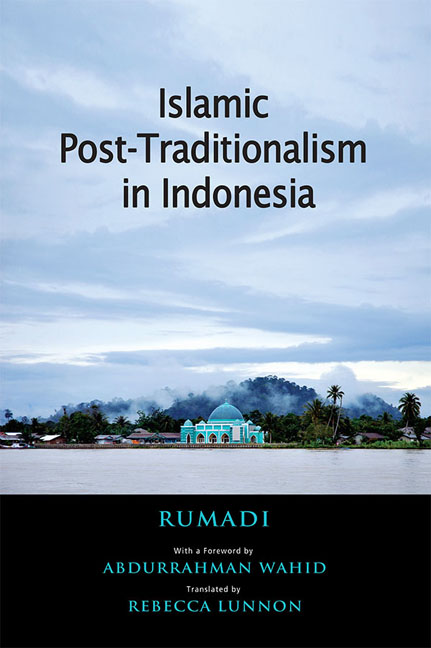4 - Islamic Post-Traditionalism and the Future of NU Intellectualism
Published online by Cambridge University Press: 20 May 2017
Summary
HALAQAH: SOCIALIZATION OF THE ISLAMIC POST-TRADITIONALIST IDEA
In this section, I will examine several of the activities that the posttraditionalist community undertakes to improve and make public its ideas. I will do so by looking at a number of institutes that run halaqah(religious study groups).Study Together programmes, Bahts al-Masâil (forums), and so on as a way of spreading Islamic post-traditionalist ideas. The critical ideas of the post-traditionalist community are socialized through a variety of methods and strategies. Besides publication and public discussions, halaqah and Study Together programmes and all their variations are common methods. Halaqahare essentially seminar forums, in the broad sense of the term, which discuss religious issues related to contemporary demands according to a set curriculum.
They pay significant attention to religious discourse that is progressive, liberal, enlightening, not conservative, and anti-textual/scriptural. The focus of their attention is no longer on Islam as a religion that must be taken for granted, but has shifted to the significance and function of religion in life in response to fast-paced social change. They frequently undertake studies of and criticism towards religious doctrine that is considered imprisoning, oppressive, and not in line with humanitarian values. In fact, they do not hesitate to enter the most sensitive areas of religious thought and doctrine to deconstruct and expose the ideological preconditions, culture, and myths hidden behind the sacred religious texts.
Within this critical NU community, LKiS (Lembaga Kajian Islam dan Sosial/The Institute for Islamic and Social Studies) in Yogyakarta is the most remarkable group. The institute was established at the beginning of the 1990s by progressive figures such as M. Imam Azis, M. Jadul Maula, Nuruddin Amin, and Hairussalim HS, and could be described as the driving force behind NGOs who work actively to study, introduce, and disseminate progressive ideas. Recently, many groups have claimed that LKiS is developing leftist ideas. This claim emerged largely after LKiS published Kazuo Shimogaki's Kiri Islam, Telaah Kritis atas Pemikiran Hassan Hanafi/The Islamic Left, A Critical Study of Hassan Hanafi's Thought in 1993. The book included a copy of Hassan Hanafi's left-wing Islam manifesto (al-Yasar al-Islâmî).
- Type
- Chapter
- Information
- Islamic Post-Traditionalism in Indonesia , pp. 169 - 282Publisher: ISEAS–Yusof Ishak InstitutePrint publication year: 2015

